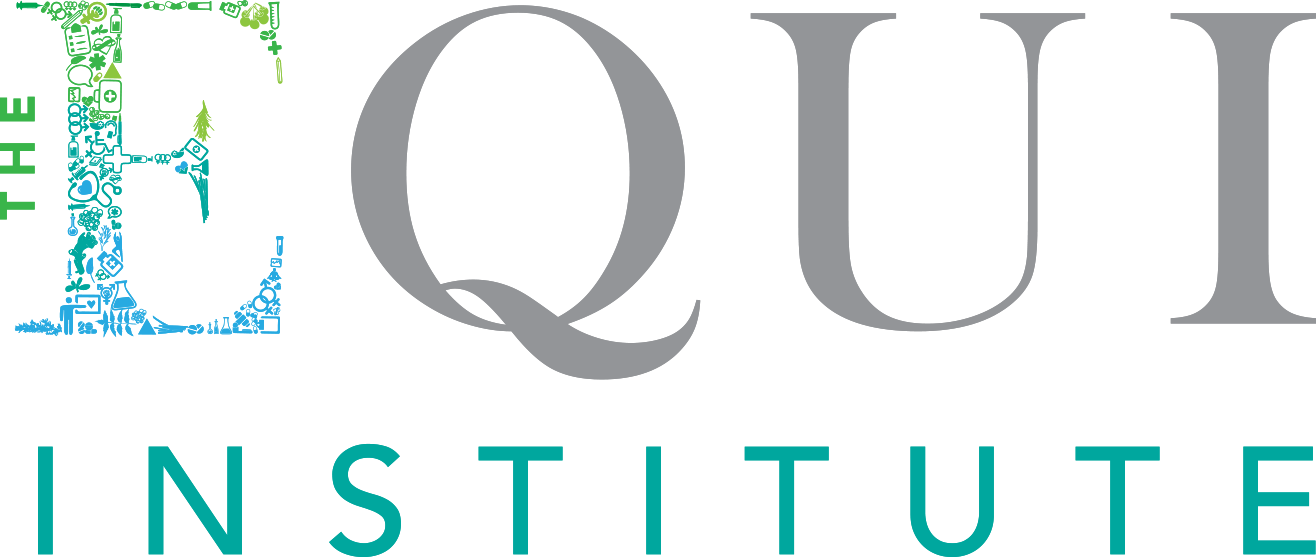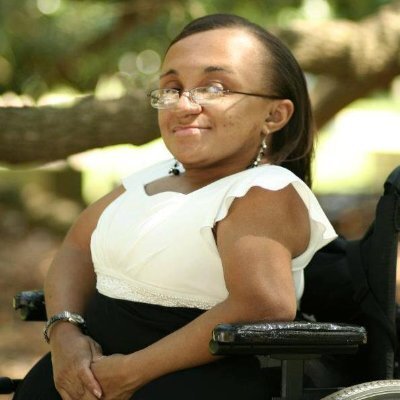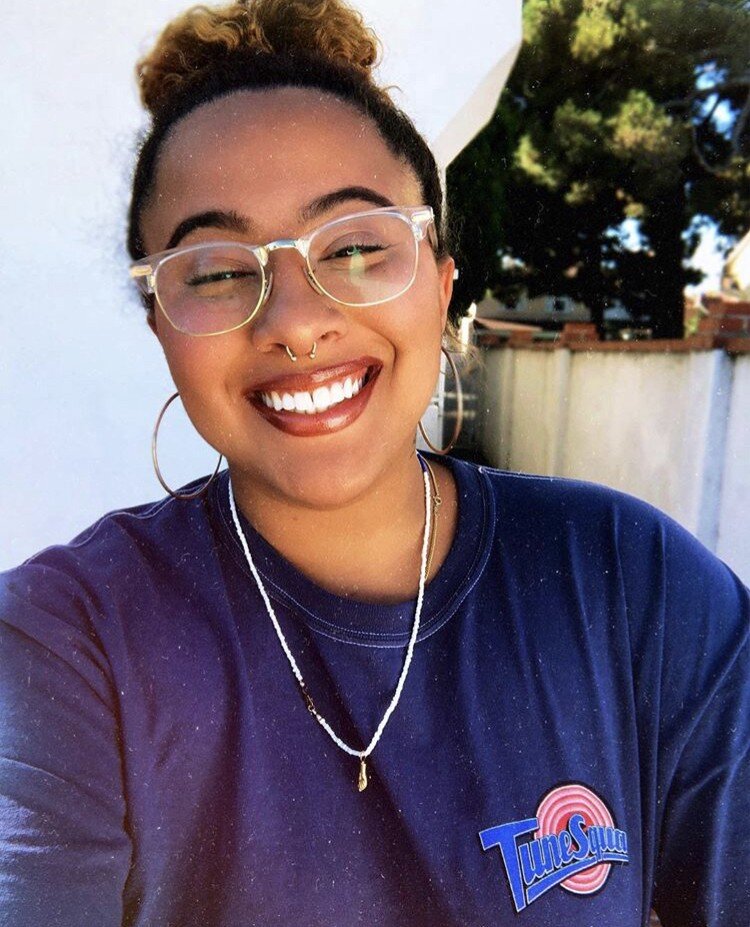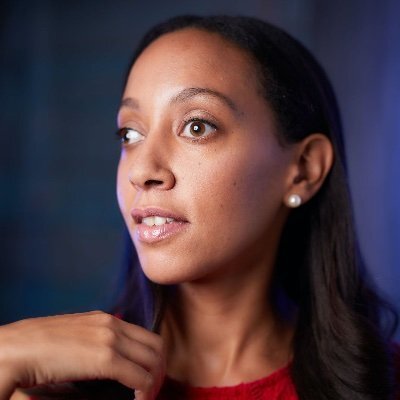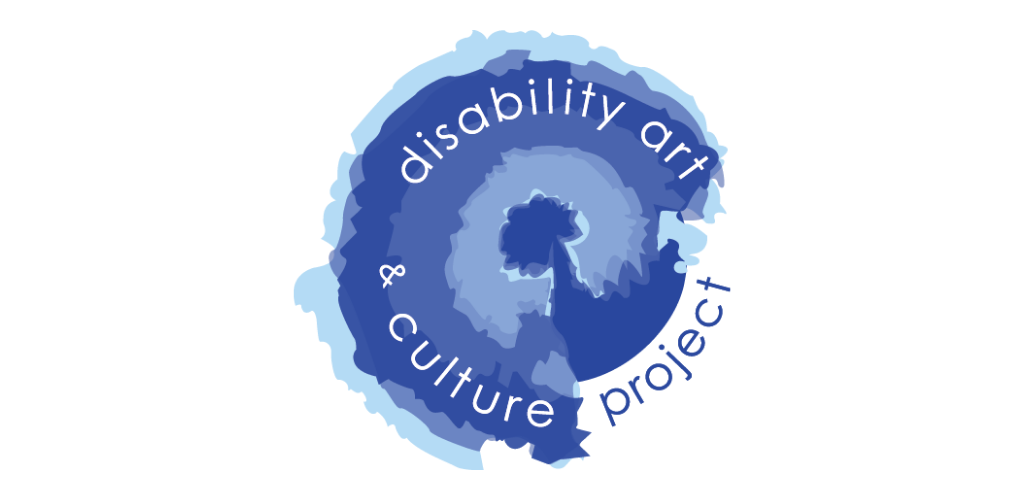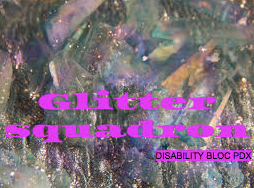Anti-Racist Organizing and Disability Justice
image 1: Back view of a protester using a wheelchair in a parking lot. They are wearing black. Attached to the back of the mobility device is a poster with a red background and white text that reads “WE RISE TOGETHER” in upper case letters. The poster also has an image of a black silhouette of a person using a wheelchair with a red bandana covering their mouth and their fist raised.
CW: discussion of anti-Black racism, ableism, police brutality, murder
“Thousands have been profiled, criminalized and killed by the police simply for existing at the intersection of their own disability and race or indigeneity. Here is the cold, hard, inconvenient truth: Over half of those killed by law enforcement annually are people with disabilities. These murdered disabled individuals also are disproportionately Black, Indigenous, Latinx, and people of color. And so, I am here to remind us all that erasure of disability in reporting and advocacy is the height of irresponsibility in journalism and activism. Regardless of intention, erasure only serves to further delay the end of state violence against racialized people and people with disabilities.”
Talila A. Lewis, self described “Social Justice Engineer. Educator. Organizer. Attorney. Artist”
To be engaged in anti-racist work means to show up and fight for disability justice. To be engaged in disability justice work means to show up and fight for racial justice. We cannot erase and fail our disabled Black and brown comrades. This blog post compiles resources to learn more about this intersection and support local and national collectives.
Talia A. Lewis calls on us as comrades, “Why can so many of us effortlessly engage in nuanced discussion of white supremacist capitalist cis hetero patriarchal imperialism and yet be completely incapable of identifying ableism?”
Learn more
First of all, what is disability justice? Read up on the 10 Principles of Disability Justice written by Patty Berne and created with other BIPOC leaders of Sins Invalid.
As you are learning more, be aware of who you are listening to and reading. Oftentimes white academics will speak over and erase the work of Black people and people of color working to integrate disability and racial justice. Be sure to read and support disabled BIPOC directly. Here is a list of organizers scholars, attorneys, artists and cultural workers, journalists, bloggers, philosophers, community builders and advocates courtesy of Kerima Cevik:
Abla Abdelhadi, Akemi Nishida, Alexis Toliver, Alice Wong, Angel Love Miles, Azza Altiraifi, Billie Rain, Bridget Anderson, Candace Coleman, Carolyn Lazard, Christopher Huff, Cornelius Sloane, Cyrée Jarelle Johnson, Deborah Danner, De’Lasha Singleton, Denarii Monroe, Dolores Tejada, Dustin P. Gibson, E. Ashkenazy, Eddie Ndopu, Emmitt Thrower, Erica Garner, Imani Barbarin, India Harville, Jamelia Morgan, Jane Dunhamm, Jen Deerinwater,Jesse “DJ Quad” Morin, Jina B. Kim, Joe Kadi, Johanna Hedva, Kalief Browder, Kat Perez, Kay Ulanday Barrett, Keith Jones, Keri Gray, Kenya Lowe, Kerima Çevik, Khairani Barokka, Ki’tay D. Davidson, Kris Young, Kylie Marie Brooks, La Mesha Irizarry, Lateef McLeod, Leroy F. Moore Jr., Leah Lakshmi Piepzna-Samarasinha, Lisa “Tiny” Gray-Garcia, Lisette Torres-Gerald, Lydia X. Z. Brown, Maria “Conchita” Hernandez Legorreta, Mia Ives-Rublee, Mia Mingus, Michón Neal, Mickey Jay Samantha / Mickey Valentine Thomas, Mikael Lee, Mimi Khúc, Morénike Giwa Onaiwu, Ngọc Loan Trần, Nina de Jesus, Nirmala Erevelles, Patricia Berne, Sami Schalk, Sandy Ho, Sara María Acevedo, Seema Bahl, Shana Bulhan Haydock, Stacey Milbern, Stephanie “Najma” Johnson, Subini Annamma, Sunjay Tojuhwa Smith, Timotheus Gordon Jr., Trudy Hamilton, Venida Browder,Victoria M. Rodríguez-Roldán, or Vilissa K. Thompson, among many others.
Read Sins Invalid’s “Skin, Tooth, and Bone: The Basis of Movement is Our People, a Disability Justice Primer” (2nd Edition).
Sins Invalid is a disability justice-based performance project led by and centering disabled QTBIPOC.
7$ online download of Skin, Tooth, and Bone
Follow these cool disabled organizers doing work at the intersection of disability and racial justice.
Vilissa Thompson, LMSW Founder of Ramp Your Voice! • Disability Rights Consultant • Aspiring Author • Macro LMSW • Proud Black Disabled Woman • Writer
Walela Nehanda Queer. They/Them. Organizer. Writer. @spitjustice Bone Marrow Transplant Hopeful.
Haben Girma Disability rights lawyer, author & speaker. Disability drives innovation. My new book: Haben The Deafblind Woman Who Conquered Harvard Law
Mia Mingus writer, educator and community organizer for disability justice and transformative justice. She is a queer physically disabled Korean transracial and transnational adoptee raised in the Caribbean
Images below show, from left to right, Vilissa Thompson, Walela Nehanda, Haben Girma, and Mia Mingus.
Image 1: Vilissa Thompson, a Black woman, is seated using a wheelchair. She is wearing a white blouse, glasses, and her arms are folded over her lap. Image 2: Walela Nehanda, a Black non-binary person, smiles at the camera. They are wearing a navy shirt, glasses, and gold hoops and a gold necklace. Image 3: Haben Girma, a Black woman, poses for a headshot. She is wearing a red top and pearl earrings. Image 4: Mia Mingus, a Korean woman, is seated in a red chair. She is wearing a denim jacket, glasses, and her arms are folded over her lap.
Follow The Harriet Tubman Collective, a self described, “collective of Black Deaf & Disabled organizers, community builders, activists, dreamers, lovers striving for radical inclusion and collective liberation”
Support the POOR Press
POOR is a poor people led/indigenous people led non-profit, grassroots, arts organization dedicated to providing revolutionary media access, arts, education and solutions from youth, adults and elders in poverty. The POOR Press runs a program in which very low and no income adults and youth are given the opportunity to create a book from start to finish, beginning with creative writing, narrative essays and poetry and then progressing to graphic design and layout publishing and promotion. Since its inception, POOR Press has provided revolutionary media access for the silenced voices of 49 youth, adult and elder poverty scholars by publishing their books of artwork, poetry and short stories, thereby sharing their urgently needed scholarship, voices and solutions with the world.
Support Local Disability Justice orgs/collectives!
Support the Disability Art and Culture Project (DACP)
The mission of the DACP is to further the artistic expression of people with both apparent and non-apparent disabilities.
We view disability as a natural and valuable variation of the human form. We believe affirmative disability identity is intertwined with racial, gender, social, and economic justice.
DACP accomplishes this mission by supporting the creative expression of people with disabilities. DACP utilizes the performing arts as a method of examining disability in relation to society. DACP also supports established and emerging artists, as well as the community at large, in developing knowledge and expression of disability culture and pride.
Image 1: above on the left is the logo for the Disability Art and Culture Project. There is blue ink blot like shape. Written on top in white and blue lettering is the text, “disability art & culture project” in lower case letters. Image 2: above on the right is the logo for Glitter Squadron. The background is pink, grey, and blue glitter with light refracting off. Over that is pink lettering that says, “Glitter Squadron”. Below that is a pink text box with black lettering that says, “Disability Bloc PDX” in upper case lettering.
Glitter Squadron
A community collective est. May Day 2017, “committed to uplifting and visibilizing disabled folks. . . supporting Black people and people of color. . . support[ing] self and joint advocacy. . . [and supporting] self and community care”.
In their own words:
We are focused on abolishing ableism, which we recognize to be rooted in capitalism and white supremacy. We strive to abolish carceral ableism which is a settler-colonizer concept of forced assimilation to a productive model through forced, often violent, rehabilitation. We organize as a small core collective with a larger base.
We engage in community care and solidarity, challenging systems and group cultures to include disabled existence, direct action, training and education. We are committed to doing so until all marginalized bodies are free from oppression and INCLUDED and seen in this community.
Check Out Glitter Squadron's New Project, PDX Disabled Support
"Caregiving is an intimate act that involves trust and understanding, often at people’s most vulnerable moments. We hope to encourage long-term, stable caregiving relationships and ongoing accountability in the community through this program. Let's form long-lasting relationships with community members who are committed to disability justice, anti-racism, abolition and anti-oppression. We ask our care workers to commit to not calling the police, in an effort to dismantle racist institutions and form our own systems. We are setting up a program to match disabled people and caregivers. Because disabled people are often isolated, this program uses community hubs and care pods* to build community and support networks for both disabled people and caregivers."
"A community care pod is a small collaborative group of disabled people, advocates, and care workers based on geographical location, cultural background or previous relationships. Each pod self-organizes and co-creates a space that works best for them to balance accountability, accessibility needs, language, and taking care of themselves. They are interconnected with different support hubs—delivery, supply, wellness, emotional and others—that are based on the personalized care plans of the disabled people of each pod." *Mia Mingus solidified this into a theory of Pod Mapping on behalf of the Bay Area Transformative Justice Collective.
Their website will be up soon, but in the meantime, for more information, please write them at: pdxdisabledsupport@protonmail.com
For more on Pod Mapping from the Bay Area Transformative Justice Collective
“Your pod is made up of the people that you would call on if violence, harm or abuse happened to you; or the people that you would call on if you wanted support in taking accountability for violence, harm or abuse that you’ve done; or if you witnessed violence or if someone you care about was being violent or being abused.”
At the bottom of the page, you can download a basic pod mapping worksheet, where you are encouraged to map out your pods and “have conversations with [your] pod people about pods and transformative justice, as well as to actively grow the number of people in your pod and support each other in doing so.”
“Growing one’s pod is not easy and may take time. In pod work, we measure our successes by the quality of our relationships with one another and we invest in the time it takes to build things like trust, respect, vulnerability, accountability, care and love. We see building our pods as a concrete way to prepare and build resources for transformative justice in our communities.”
Check out these national orgs/collectives/organizers + Donate
Autistic Women and Nonbinary Network (AWN)- Giving directly to autistic people of color
HEARD- Supporting deaf BIPOC who are incarcerated or going through the legal system
Disability Justice Culture Club- Delivering funds to QTBIPOC in the Bay Area
Donate here: Venmo @Yomi-Wrong
Click here to learn more
Sins Invalid- Disability justice based performance project, led by disabled people of color, that incubates and celebrates artists with disabilities, centralizing artists of color and LGBTQ / gender-variant artists as communities who have been historically marginalized.
Disability Visibility Project- Online community dedicated to creating, sharing, and amplifying disability media and culture.
Ramp Your Voice- Content creator sharing about the intersectional disabled experience
Additional Resources
Check out this guide on Disability inclusive protest etiquette
Check out this super comprehensive piece written by Kate Tastrom, DIsability Justice Committee Co-Chair of the National Lawyers Guild entitled “Disability Justice and Abolition”
Check out this informative series from The Comrade Closet entitled, “[At Least] 7 Ways to Start Undoing Ableist Capitalism in the Everyday- And in Times of Crisis”
Check out this accessible march co-organized by Harvey Ross and NuNu Davis in Milwaukee
Check out Shaheem Sanchez speaking on being “deaf while Black, signing while Black”
Check out Shaheem Sanchez demonstrating ASL signs for protests
Check out Bruce John demonstrating 10 ASL signs for protests
_____
“If your liberation journey ends short of disability justice, you too are complicit in perpetuating violence on and within your own community. Disability is the tie that binds. And so, it is impossible to achieve justice without achieving disability justice. Thus, if you are not naming and addressing racism and ableism in your actions, you are fighting a losing battle” - Talila A. Lewis
